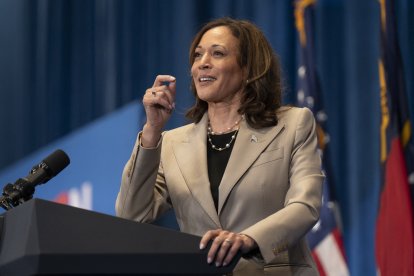Kamala's black! Kamala's Indian! Kamala's a woman! The alchemy of identity politics
Republicans accuse Harris of manipulating her identity, downplaying her Indian heritage and promoting a black identity as an electoral strategy. This game could be more offensive than beneficial at the ballot box.

Kamala Harris
Even before the first question, the climate was heated. The very announcement of Trump's participation on an NABJ panel was answered with a resignation at the top of the organization. Karen Attiah, a columnist for The Washington Post, explained later that she had stepped down as co-chair of the event in protest of both the guest and the format, "which I rightly feared would allow a White politician to make our Black press advocacy organization into an instrument of his agenda."
The opening question to the former president raised the tension. "I don't think I've ever been asked a question in such a horrible manner," Trump replied, but it was only the second one that finally ignited the spark of controversy:
Is Harris a "DEI (diversity, equity and inclusion) hire"? Is she a candidate just because, in the anchor's words, "she is a black woman?"
Trump replied that, really, he didn't know. "Could be," he hesitated. So much for the DEI question. The Republican's words that raised leftist ire were those that followed, transcribed here verbatim:
"I’ve known her a long time indirectly, not directly very much, and she was always of Indian heritage, and she was only promoting Indian heritage. I didn’t know she was black until a number of years ago when she happened to turn black and now she wants to be known as black. Is she Indian or is she black?"
And then he continued:
"You know what? I respect either one, but she obviously doesn't. Because she was Indian all the way, and then all of a sudden she made a turn and she became a black person."
Democrats and progressives came out against Trump. White House spokeswoman Karine Jean-Pierre said the former president can't tell Harris her own identity. WSJ wrote, "Trump blasted ABC News and continued to attack Harris for her identity." But that's not what he did, and that's not the point.
Trump then insisted on Truth Social, with a video of the Democrat cooking Indian food: "Crazy Kamala is saying she's Indian, not Black. This is a big deal. Stone cold phony. She uses everybody, including her racial identity!"
The Republican candidate's last words reveal the real point of the discussion: it is not whether Harris has the ancestry or the color to define herself as black or not, but her use of different identities for political gain.
Identity politics
Religion, language, nationality. Gender, sexuality. Ethnicity. All are listed by Indian scholar Satyabrat Sinha as categories on which identity politics can be based.
"Identity politics is suggestive of the fact that people's politics is shaped by aspects of their identity and who get together to increase their power and address their marginalization," he adds in a study titled "Ethnicity and Identity Politics."
Discussions of a potential candidate's eligibility in the United States usually address these identity issues without much discretion. An example is the vice a presidential ticket. While Biden promised four years ago that his running mate would be a woman, Harris' current slate of candidates is composed of five white men.
A black woman needs a "white statesman as a validator," in the words of Kimberly Peeler-Allen, co-founder of an organization that promotes the election of black women, to the The Washington Post. A woman needs a man, a black man needs a white man. Peeler-Allen uses Biden as evidence when he was Obama's running mate. The idea is so accepted among Democrats that as soon as Harris emerged as a candidate, memes began circulating about her own V.P. choice:
Identity components such as sexual identity (which point in favor of Pete Buttigieg, who is gay) or gender (point against Gretchen Whitmer) are weighed on the same scale as experience and oratory capacity, among others. But the Democratic Party is not only calculating identities to choose vice president, but also to divide its own supporters. The Harris campaign organized a video call called "White Women for Kamala," and then there was another movement called "White Dudes for Harris."
Ramaswamy: 'A party obsessed with identity politics'
"Kamala leaned into her Indian heritage when it was convenient in California," wrote Vivek Ramaswamy, the son of Indian immigrants. "She’s now casting that aside & leaning into black identity when it’s convenient nationally."
"Identity politics is a losing game for our country, it’s our American identity that really matters in the end."
In an interview with Fox, the former candidate for the Republican nomination claimed that "many Indian Americans in the United States are indeed somewhat offended by the way Kamala has suddenly cast aside the Indian American side of her identity."
"Personally, I don’t think we should be relying on this personal identities at all."
Kamala leaned into her Indian heritage when it was convenient in California, she’s now casting that aside & leaning into black identity when it’s convenient nationally. Identity politics is a losing game for our country, it’s our American identity that really matters in the end. pic.twitter.com/NhRNKE0a8B
— Vivek Ramaswamy (@VivekGRamaswamy) July 31, 2024
The dubious payoff of identity politics
The benefits of identifying with a particular group are considered common sense in political calculations. Gallup senior analyst Frank Newport, however, points out that the polls do not reflect this.
"We don't have much research I'm aware of that asks Americans directly whether any particular aspect of their identity drives their political views," he wrote in an article titled "Identity Politics in Context." However, he added:
"I think it's fair to conclude that tribal membership and group identification are powerful forces in almost all contemporary societies. This makes it not surprising that identity groups can play a significant role in U.S. politics."
James Bennet, a columnist for The Economist, notes that one of the successes of the Obama campaign was to realize that, to a large extent, "his racial identity can announce itself." And, in mentioning it, not to dwell on the challenges it posed to him, in self-praise mode, but rather that his candidacy was America's praise. Harris, he argues, should copy the tactic.
When Black Lives Matter refused to support "installing" Harris as a candidate, Thomas Chatterton Williams of The Atlantic pointed out that the group was breaking with its usual appeal to identity politics. He then asserted that this is evidence of how disingenuous and condescending it is to demand the black vote simply by having a black candidate.
"The Black voters defecting to Trump have recognized this, and the leaders of Black Lives Matter have now stated it plainly," Chatterton contended before asking, "Will the Democratic Party take note?"
Defending against identity politics
In a speech on conservative criticisms of identity politics, Richard Reinsch, founder of the American Institute for Economic Research, explained that identity politics reduces people. One component, "above all, race or gender," obfuscates all the rest.
"In this view, people are to understand themselves solely through these prisms and apply that understanding to others and to institutions," he argued in words published by The Heritage Foundation.
Identity politics also carries with it the idea that there is no such thing as individual reasoning beyond identity, Reinsch argues. And, he says further, it brings about a kind of discrimination:
"Those who have identities that can be grouped under 'persons of color' or under the LGBTQ label possess greater authority to speak in almost every sphere—owing to the various oppressions they have experienced and the cosmic redress required for justice and liberation—than 'oppressor' groups."
At the end, he summarizes, the source of conservatives' rejection of these kinds of strategies should go through the defense of the individual: "one rooted in being a constitutional people of citizens as individuals, not groups."
RECOMMENDATION





















